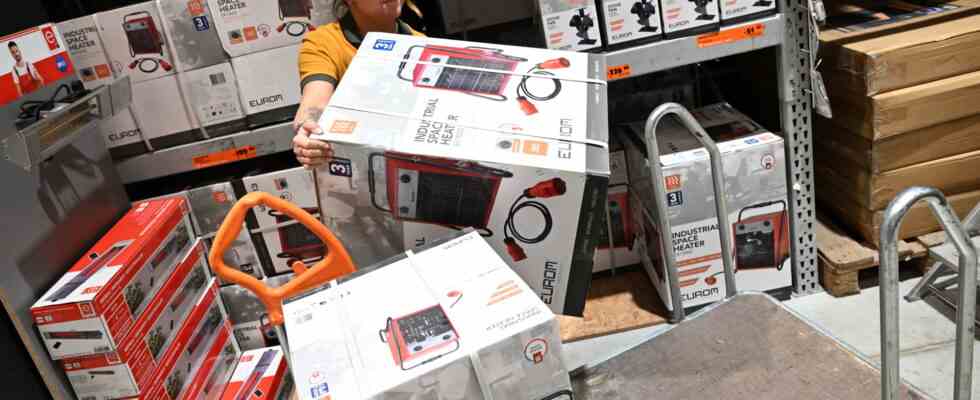Status: 07/24/2022 1:00 p.m
Many Germans are currently buying heaters and stoves out of concern that gas will run out in winter. The shelves in the hardware stores are empty. These alternatives are at most an expensive emergency solution.
In the Swertz hardware store in Goch, offer signs hang on the fans. But despite the summer temperatures, customers are asking for fan heaters, radiators or stoves. “It’s strange,” says Robin Hoiboom. He works in the heating and plumbing department. At least 25 customers stand in front of him every day and ask about everything that heats.
“They’re actually afraid of freezing in winter,” he says. “Customers don’t want to heat the whole apartment with it. But they want to be able to at least sit in a room where it’s a bit warm.” The only problem: his warehouse is now almost empty. Hoiboom keeps waiting lists. He expects new deliveries in mid-November – “if we’re lucky”.
“Right Onslaught”
As in the Gocher hardware store, the situation is currently nationwide. That shows one WDR-Inquiry at the largest hardware store chains. The hardware store chains report that the demand for heating alternatives has been increasing since last November, when the first gas price increases became apparent. However, the beginning of the Ukraine war accelerated the development again rapidly. “With the proclamation of the second stage of the gas emergency plan, there was a real rush on many markets,” writes a chain.
Many customers inquire about radiators as well as convection heaters, fan heaters, stoves and the associated fuels such as wood, gas, pellets and coal. One market reports: “We are currently selling around 50 percent more electric heaters than in the previous year. This high demand runs through the entire range, across all quality and price ranges.” The warehouses are partly empty. Since hardware stores have to order the goods from the manufacturers months in advance, it is not to be expected that subsequent deliveries can be made quickly.
Heaters only suitable for emergencies
“Anyway, such devices are at most a solution for emergencies,” says Reinhard Loch, energy expert at the consumer advice center in North Rhine-Westphalia. For example, when the gas supply actually fails. In terms of costs, continuous operation with electric heaters is not a cheaper alternative.
Anyone who still wants to take precautions is best served with the radiator oil heating: “The combination of radiant heat and warm air is what is generally felt to be the most pleasant,” says the energy expert. Convection heating and fan heaters, on the other hand, only heat cold air. The latter has the advantage that it is very small and can heat up rooms such as a bathroom very quickly. Fan heaters work like a big hair dryer and are the cheapest.
All three devices are mobile and can be used near any socket. There is “no difference in efficiency” between radiators and convectors. One device is sufficient for small apartments up to 40 square meters, for larger ones we recommend two. He would not use more devices because that could overload the home electricity network.
The revival of the fireplace
Lucky are those who already have a fireplace installed in their house. But the fuels for this are also becoming scarcer and therefore more expensive. In the meantime, the firewood sacks are ready by the pallet in the outdoor area of the Tinks hardware store in Wachtberg near Bonn. “There are customers who pack their shopping carts with 20 bags full,” says store manager Dominik Grohs. He might have otherwise seen such scenes in late autumn or winter. “Anyone who has a fireplace is now hoarding firewood.”
He has just received a new delivery: 60 cubic meters of hardwood mix from Eastern Europe. The capacities of the providers from the region have long been exhausted. Grohs has already sold 25 of the 60 cubic meters. He also keeps waiting lists – even though the wood is becoming more expensive almost every day. Before the crisis, a cubic meter cost 99 euros. It is now almost 200 euros. But the demand doesn’t stop. And that, he suspects, will continue for the time being.

